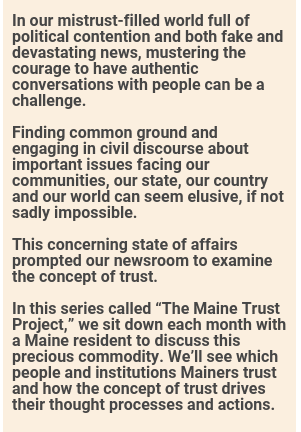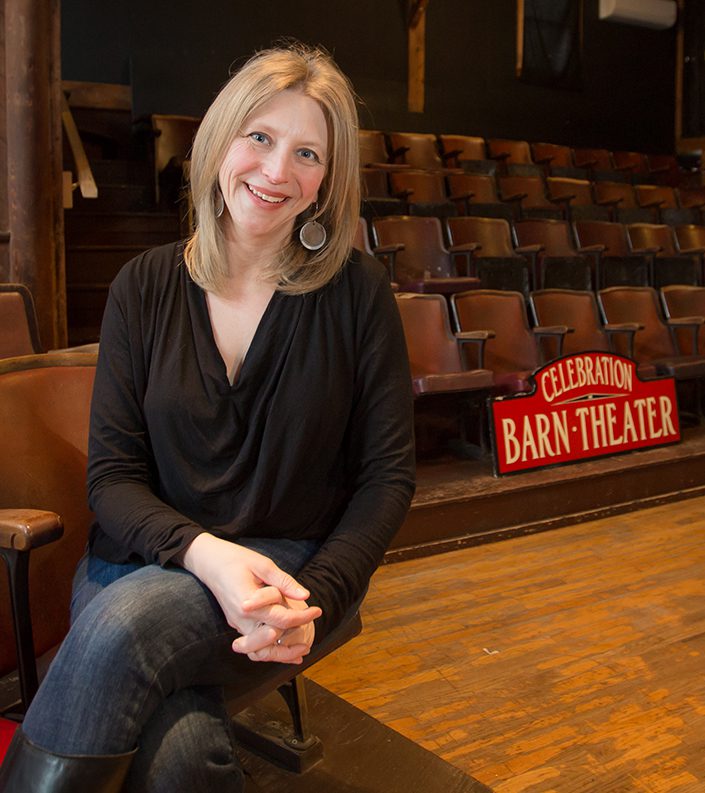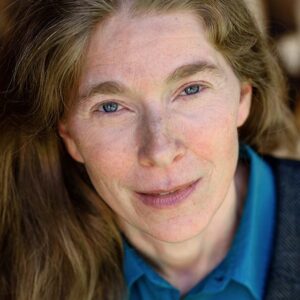When physical comedian Amanda Huotari was about 10 years old, in her hometown of South Paris, she saw an ordinary man transform himself.
You could argue that this man — the late master mime artist Tony Montanaro — was anything but ordinary. But, alone on the stage, dressed totally in white, without props, there was nothing to suggest what was about to happen.

Before Amanda’s young and amazed eyes, and without uttering a word or sound, he morphed from human-ness to rooster-ness.
“He just slowly, physically, transformed himself into the shape, the rhythm, the dynamic of a rooster, and that was so stunning to me because I had never seen somebody so completely commit to such a simple idea,” she said. “It’s just the kind of idea that if someone said, ‘OK. I’m going to perform a theater piece. I’m going to be a rooster.’ You’d go, ‘Mmmm. Umhmmm. What else are you thinking about doing?’ You know, ‘What other ideas have you got?’
“But to see the power of his trusting himself — he’s trusting this idea, this premise of transformation — and his trust that with his focus he would be able to bring the audience along with him and to meet him — required so much. That required so much trust.”
As a veteran performer and arts educator herself — she is also executive artistic director of Celebration Barn Theater, the South Paris-based theater that Montanaro founded as a center for physical theater training, creation and performance — she has experienced that level of trust for herself and with an audience many times.

“Audiences are so amazing because they’ve already made this leap of faith. They made a leap of faith that they don’t know what’s going to happen and they’re going to come along for this journey,” she said.
That doesn’t mean there isn’t a moment for the audience and the artist when they’re not sure if their trust will be rewarded. That moment of anxiety comes, she said, when both are awaiting that first burst of laughter. And as soon as that moment comes, phew! Everyone surrenders to the shared experience, the journey that the performance is taking them on.
“You talk about trust being on a continuum,” she said. “The audience is trusting something’s going to happen. The artist is trusting something is going to happen. And together, the more that we can actually create moments with elements of surprise, the more that we’re going to trust that we have the capacity to do that.”
Q&A
Who meets your definition of trust and how do they meet it?
Amanda: Well, certainly, my family, my husband. They are very loving and supportive and nurturing. My husband and I have a relationship that is fundamentally built on supporting each other’s individuality and our differences.
And outside my family, I would say some of my artistic collaborators who have become friends. The trust that happens for us happens in the studio and on stage. In the studio brainstorming ideas, our responsibility is to generate as many different ideas as possible, and that requires an openness and a willingness to trust. We know that we’re going to create something together that is bigger than ourselves individually. There’s no judgment in that process. And on stage, the stakes are higher, so there’s even more of a need to trust and to fundamentally agree that we are going to go out there to make each other look good.
Who doesn’t meet your definition and how do they fail to meet it?
Amanda: Anybody who I don’t think is being honest, whose actions are not consistent with their words and who I think is trying to make themselves powerful by minimizing or hurting or putting down somebody else.
What breaks trust for you?
Amanda: What breaks trust is seeing somebody trying to overpower or control somebody else by making them lesser, by making another person lesser in order to make themselves appear stronger.
Can broken trust be healed?
Amanda: I think if the trust in a relationship has been broken, it can only be rebuilt if there’s a willingness to take time for a healing process and transformation to occur.
I had a best friend who very much wounded me, and who I didn’t speak to for about six months. I had no availability to be healed. I was not interested in a conversation. There was nothing that could be said or done because I was completely in my own process. As soon as I was ready to re-engage, the apology couldn’t have been any more sincere. If you are not available to receive an apology, then an apology doesn’t matter whether it’s sincere or not. In order to have trust, you have to be trustful. So much of the process of trusting is an individual journey that you take.
Has your definition of trust changed over the years, and if so, how?
Amanda: Yes. The gift of the polarized political environment of the last few years has made me realize how privileged I have been and how the “system” has worked for me and how many opportunities I have had. I trusted that system and that it was working similarly for others. But I have become aware of the degree to which so many individuals and marginalized communities haven’t been as privileged as me, and have every reason to be distrustful of a system that has continued to keep them oppressed — to understand and appreciate the challenges that individuals face when they don’t feel fundamentally safe.
Do you think the cultural definition of trust has changed?
Amanda: Yes. I think that right now we are so blinded by our media blur and our political chaos that we don’t know what is true or what to trust or who to trust anymore because for everything you can find that says ‘Here are the facts: it’s white,’ you find something else that says ‘Here are the facts: it’s black.’ And in fact, there’s a lot of gray. So, I think that more than ever, it’s becoming increasingly important that we are able to balance the relationship that we have with our screens with the relationships we have with other people in the same room. And that we are able to create a space where we can have dialogue and explore ideas together and that we don’t go into conversations with the objective to prove that somebody else is wrong or prove that we are right.
What worries you?
Amanda: What worries me is a mind-numbing addiction to screen time. If our relationship is with a screen as opposed to having relationships with people in real time having one-on-one conversation, then we lose the ability to communicate with each other. I worry, too, about the pace at which information comes. It’s so fast that there isn’t a process of engaging with it, so it becomes meaningless.
What inspires you?
Amanda: What inspires me is seeing people create collaboratively together. What is inspirational about that is there is an openness, there is a curiosity, there is a gameness to the assumption that by engaging together not only are we going to create something, but we are going to continue a process until we find something that delights us.
What issues on the state or local or national or international level do you think are really important?
Amanda: There are many, but one of them that strikes me is how we can look to make cultural shifts by creating access and exposure to the arts. I was privileged to have supportive parents and access to the arts. Not everyone has that. The arts provide young people, in particular, the tools to gain self-awareness and self-confidence, to activate imagination, to learn how to express themselves and to explore new ideas and new ways of thinking. The arts provide a skill set that can be, and is, in fact, essential in any professional application, whether that’s in a corporate setting, or on a stage, or in a doctor’s office.
Get to know Amanda Huotari
Age: 41
Residence: Buckfield
Religious affiliation: I was baptized and confirmed Lutheran, but have found more spiritual well-being, I would say, through the forces of nature and creativity.
Political affiliation: I agree with a lot of Democrat ideology, although I don’t think it’s particularly helpful right now to begin any conversation by identifying with a political alliance. That does not lend itself to dialogue, so, if we are willing to find out what’s possible, I don’t think political affiliation is a helpful label.
How she describes herself: As an artist, an optimist and a diplomat.
How she defines trust: I think trust is a gut feeling of safety and surety. There is a comfort that allows for freedom of exploration so, in terms of theater, trust is absolutely essential to the creative process — to even begin. You have to have some level of comfort to begin exploring an idea. If you are distrustful of your ability to create something, then you never get started, so there is also a trust in oneself. There is a trust necessary for any kind of collaborative relationship, including personal ones.







